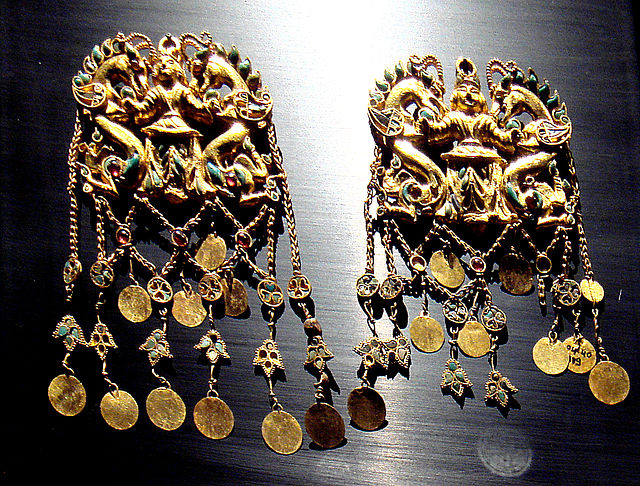Diodotus I Soter was the first Hellenistic king of Bactria. Diodotus was initially satrap of Bactria, but became independent of the Seleucid empire around 255 BCE, establishing the Greco-Bactrian Kingdom. In about 250 BCE, Diodotus repelled a Parthian invasion of Bactria by Arsaces. He minted an extensive coinage and administered a powerful and prosperous new kingdom. He died around 235 BCE and was succeeded by his son Diodotus II.
Gold coin of Diodotus c. 245 BC. The reverse legend reads: "ΒΑΣΙΛΕΩΣ ΔΙΟΔΟΤΟΥ" – "(of) King Diodotos". Cabinet des Medailles, Paris.
Tetradrachm of Diodotus I of Bactria, 250–240 BCE. Obverse: diademed bust right. Reverse: nude Zeus standing left, holding aegis over his outstretched left arm and hurling thunderbolt with his right hand, eagle in the field, ΒΑΣΙΛΕΩΣ ΑΝΤΙΟΧΟΥ ('of King Antiochus'). From Shahr-i-Nau, Hisor District, Tajikistan. National Museum of Antiquities of Tajikistan.
Bactria, or Bactriana, was an ancient Iranian civilization in Central Asia based in the area south of the Oxus River and north of the mountains of the Hindu Kush, an area within the north of modern Afghanistan. Bactria was strategically located south of Sogdia and the western part of the Pamir Mountains. The extensive mountain ranges acted as protective "walls" on three sides, with the Pamir on the north and the Hindu Kush on south forming a junction with the Karakoram range towards the east.
Xerxes I tomb, Bactrian soldier c. 470 BC.
Pre-Seleucid Athenian owl imitation from Bactria, possibly from the time of Sophytes.
Gold stater of the Greco-Bactrian king Eucratides
The treasure of the royal burial Tillia tepe is attributed to 1st century BC Sakas in Bactria.






